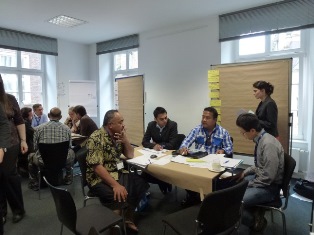The PACE-Net Plus Conference took place in Bremen from 9th–11th September 2014. Selected participants from Europe and the Pacific identified priority areas for future joint research cooperation between both regions to address the global challenges, and identify funding options and potential participating institutions. These areas were discussed in three Think-Tanks, which combined interactive sessions (world café process, interactive brainstorming, methodologies for priority identification) with bottom up based discussion on future needs/priorities and providing recommendations. Participants from Pacific OCTs coming from Research Centres, Regional Organisations and Universities (in New Caledonia and French Polynesia) participated actively in the three think tanks.
The Pacific-Europe Network for Science, Technology and Innovation (PACE-Net Plus) supports the EU-Pacific policy dialogue and cooperation for addressing a number of major societal challenges: health, food and nutrition security, climate change and the environment, by means of the above mentioned complementary methodologies. The Think Tanks came up with a set of challenges, needs and concrete projects on each of the themes proposed.
Think Tank 1 — Health related to Non Communicable Diseases (NCD). The outcome for this Think Tank related to Health, and more specifically to Non Communicable Diseases (NCD), identified that the Pacific is suffering a faster rate increase of NCDs, which in turn can help tackle similar challenges and develop solutions to EU’s NCDs.
Think Tank 2 — Food and nutrition security — exploring the convergence of science and traditional knowledge in aqua and agriculture for sustainable healthy living in the 21st Century. The Think Tank came up with some priority groupings ranging from Aquaculture (Establishing Research centre for Pacific aquaculture) to Climate resilient agricultural practices and linking islands’ micro climate to the tenure and intellectual property rights by converging traditional knowledge and western science tenure intellectual property rights (IPR. There were also discussions around the fragmentation and innovative methodologies to be developed around this theme by expanding the multidisciplinary circle of collaborators e.g. Lawyers for IPR issues.
Think Tank 3 — Enhancing the community resilience managing, environment and water resilience in a changing climate. The discussion provided a set of baselines where the Pacific shares important characteristics to take into account. The most relevant ones were: resources belonging to the communities and not the governments, strong competition for scarce resources in such territories, small islands and large oceans in extreme remoteness that entail diverse environments and cultures but also extreme climate events and high climate variability.
The importance of developing human and ecological community resilience was also highlighted, as well as policies and practices related to mitigation, impacts and adaptation of changing climates. Similarly, the need was underlined to effectively address water and food security and to improve management of resources and governance, maintaining and developing pacific livelihoods, fostering education, vocational training and awareness-raising.
The final plenary gathered the three Think Tanks results and look forward to actions to be implemented during the lifetime of PACE-Net Plus. Four main points were identified across the Think Tanks that ranged from policy, data collection issues, research capacities, to community level approaches to be accounted for future Horizon 2020 project development. Encouraging transcultural research as an opportunity that must be built with project implemented values, regrouping and empowering communities through a community based approach were some of the main ideas identified. The importance of involving trans-disciplinary research and to consider it as an opportunity aggregating teams with complementary disciplines (human, social, hard science, private sector, industry and governments) to address different issues was also highlighted as a must today.
The outcomes from this event will be presented at the bi-regional dialogue platform in Auckland in December 2014. Preparing a policy paper is crucial at this point as there are no regional STI policies in the Pacific. PACE-Net Plus will contribute to this regional policy dialogue in order to provide an efficient set of recommendations to the Pacific Plan but also to try and influence Horizon 2020 calls in the upcoming Working Programmes for the Pacific region.
As for the Association of the Overseas Countries and Territories of the European Union (OCTA)’s benefit from this conference, two main points were achieved: Maintaining Networks with NCPs, the PACE-Net Plus project partners and researchers in the Pacific who were keen in joining OCTA’s network for future collaboration. Furthermore, support was provided to researchers during the Think Tank sessions. The technical representative provided on behalf of OCTA, comprehensive and practical guidance to researchers in the Pacific on how to find suitable calls for proposals matching their ideas, consortium building and supporting the elaboration of preliminary concept notes to respond to future calls. On-going collaboration and contacts with these actors will continue in the following months as well as a close cooperation with the PACE-Net Plus coordinators for the elaboration of key outcomes on behalf of the Pacific.




